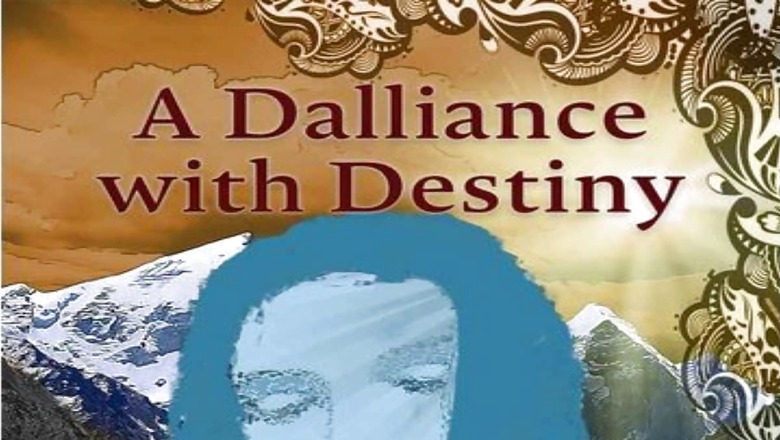
views
Running up the higher reaches of the icy Himalayan glaciers, shouting ‘neti, neti’ at all that he saw around him, the young Milan races towards Gaumukh, the cave set in the glacier where the Ganges has its origins. A fourth-generation descendant of indentured Indian labourers living in distant South Africa, he is seeking to cast away all those trappings of time and history that had bound him to a life of shame as a coolie. No more would he return to that land of his birth, to the shady colony of low caste Indians of mixed origins whose minds, trapped in painful memories of deceit, abuse and insult cling desperately to the splintering rags of lost traditions and to tales of their origin. Theirs is a culture gone to seed. Living in limbo, they weakly ape the West, hating themselves, yet trying to fit in, for they can belong nowhere else.
The autobiographical novel ‘A Dalliance with Destiny’ of the anti-hero takes a fresh look at present-day India from the vantage point of an outsider – an insider trying in anguish to ascertain his roots. Orphaned early and denied higher education, the brilliant introvert Milan had always loved to dwell on the how and why of phenomena scientific, historical, cultural, and existential looking into them closely, to understand his own life and self. In this wasteland in South Africa, it is only his maternal grandfather’s tales of their lost homelands in Northern India, of their warrior clan and of the old man’s desire that he visit those lands, which stirred Milan’s dreams and kept his spirits alive.
An invitation brings Milan to India. In his descriptions of its cities peoples, architecture and histories to his accompanying friend, reality and fantasy merge, feeding on one another, history blends with tradition and belief, and the present appears ensconced in a myth–lined past, all a glorious assemblage of time and culture standing in stark contrast with the aridity of the environment that he had been raised in. They travel in the under-bellies of Mumbai and Goa surfing through their tinsel westernized glamour, revisiting histories and architectural signposts, Milan deploring signs of the colonial past. All along, however, his obsessive human preoccupation with body and sexual gratification – the gift to him and to his people of more than a hundred years of self-debasement under slavery – mark his experiences. But he pays secret obeisance to the land of India on landing in Mumbai and in the Diamond Harbour in Kolkata as well, for from here his forefathers had boarded their ships to South Africa lured with the promise of plenty by their colonial masters. The brush with the Anglo-Indian lady in Kolkata brings physical satiation but no more.
Driving riskily, tentatively on a hijacked Mahindra Major, Milan scours the rugged plains of Northern India alone, looking into maps and governmental records for his ancestral villages. A happy homecoming ensues when by accident, he meets at jalaun, a highwayman who, it turns out, is his not so distant cousin. Despite the great warmth and hospitality he receives here, the inner call to locate the originary source of his Hindu ancestry drives him relentlessly North, to the ancient city of Banaras with its Ganges and its hoary sages nestling in their ashrams. Each brings to him many experiences that unveil the secrets of his past, present, and future. He, he is told, is the chosen one.
In Delhi, the bewitching city that none could master, he meets through sheer coincidence, the immaculate lady of his dreams. True, chaste love blossoms between the two, wiping out all the corruption of mind and body within him, but a bizarre accident puts an end to it all. As a sage had forecast, he is being speeded by some divine hand through condensed experiences of many lifetimes.
Now at the point of collapse, he is lifted up by an all-knowing sadhu who puts him to humble manual exercises that cleanse him of all preferences and pretentions; the dream and desire alone exist, pulling him up icy Himalayan precipices, beyond the already thinning commercial outposts for pilgrims and tourists. Cursing these ‘spiritual miscreants’, unmindful of his bleeding feet, hating even the devoted friend and follower, he forges upwards, shouting ‘neti, neti’. He would reach Gaumukh, the hallowed, uncorrupted cave in which the Ganga has its origins.
Milan’s reason begins to unsettle in the wild frenzy of his desire. Meeting his mother in a trance, he obtains her forgiveness for all his sins, and feels free and whole. Onward he strides through sleets of icy wind and deadly precipices of the glacier to ‘feel the Ganga’s untainted pulse in her untainted form, before the Earth contaminated her with its malignancy.’ There he would demand of God ‘the reason behind the Leela of existence’. On reaching the cow-shaped spout of the cave, he plunges headlong into the waters shouting out in ecstasy, I am Shiva. In this mental state too, desire, that single link with his former self, still rules. As Shiva incarnates, he virtually tears into the cave as if at the feminine innards of the holy river, taking her, making her his own.
This narrative of an ‘anti-hero’ who from a nameless ‘coward’ living in a dank swamp of nowhere men to a ‘hero’ scaling odds of Himalayan proportions to discover his original self, is a brilliant, racy piece of composition that will leave its mark in the history of contemporary Indian fiction.
Views expressed are personal.




















Comments
0 comment